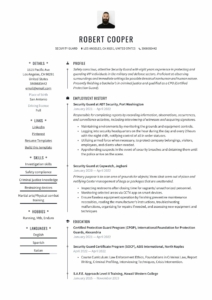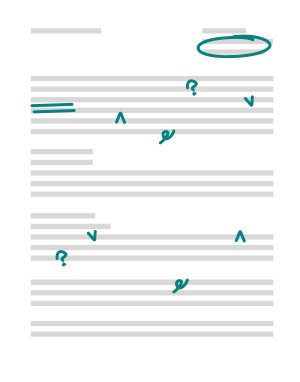How To Create An Effective Resume Even If You Were Fired

How can you make an effective resume after getting fired? People get fired from their job for various reasons. However, to a potential new employer, it may leave an unfavorable connotation on the candidate.
If you find yourself in such a situation, you may have a number of questions concerning how to address the adverse reactions you may receive from a potential employer. You may have questions such as:
- How do I impress an employer given I was fired from my last job?
- Do I include the job on my resume?
- How should I answer when asked the reason for departing my previous job?
Understandably, there are many questions on your mind. And yet, there are ways to be truthful in answering the questions your potential new employer may have for you, along with tips to make such a situation feel a little less threatening. Essentially, before updating your resume for the next job opportunity, think about:
Is The Experience From Your Last Position Relevant?
If there is little to no relevance between the positions, you do not have to showcase it on your resume. The hiring company is primarily interested in relevant experience and skills you can bring to their company. You might be able to break your resume into "Relevant Experience" and "Additional Experience" sections.
How Long Were You In The Position?
If you were in the position for only a few months, it may not be necessary to mention it on your resume. Determine if the employment gap , should you choose not to include it, would be cause for concern by an employer. In today's market, it's not a surprise to see some candidates unemployed for a year before finding a new job .
How Severe Was The Cause For Firing?
Were you laid off or fired due to lack of performance or conditions outside of your control? If the latter, then you should put on the resume the reason such as “Major Downsizing," “Company Relocated," or “Management Reorganization," all of which indicate that the termination was not due to your performance. If the reason you were terminated was due to a minor issue that can be easily explained and seen from your point of view by a potential employer, than including the position on your resume should not be a concern. Be honest with yourself and think through your response to a potential interviewer.
Your answers to the questions above will tell you whether it is appropriate to include the job on your resume. If it is included, consider the following to help you through the application and interview process.

1. Showcase Your Achievements And Accomplishments
Your mission is to get your foot in the door for an interview and to make an outstanding impression. You do not need to bring up that you were fired or laid off from your last job on paper, especially if you were only there for a year or two. Instead of focusing on how your previous job ended, quantify what you accomplished while you were employed there.
If necessary, you will have the opportunity during an interview to explain further details.
2. Don't Insult Your Past Employer
Even if you were fired and have bitter feelings toward your former boss or co-workers, your resume is not the time nor the place to reveal it. It is seen as unprofessional and leads to questions that focus on negative aspects.
So, even if the interviewer wasn't planning on asking you the reason for leaving , you may have just brought it upon yourself by insulting your past employer or hinting at a conflict there on your resume.
3. Don't Lie About Your Employment
You should never lie on your resume . Don't fabricate anything on your resume or your reason for looking for a new job. If asked about this during an interview, you need to address the question truthfully, but keep it brief regarding the reason for your departure and move on to more positive points. At least you now have your foot in the door and have a greater advantage of explaining the reason for departure in a more positive light.
You can also use it to your advantage to reinforce points of achievements and accomplishments that may apply to the job. Remember that companies do check references and background information. Any candidate caught lying is grounds for dismissal.
4. Pull Together Your References
Gather people you worked with on the job as references , whether it's co-workers, clients, or vendors. Individuals who worked with you on the job and who can speak positively about your work can help effectively rid any negative connotations associated with being fired.
In this instance, it makes sense to include references with your resume, especially written recommendations.
5. Focus On Functionality Rather Than Chronology
This is a last resort option. Functional resumes typically are not used since it lacks detail on dates of employment—information most employers want to know.
A functional resume focuses on grouping specific skills and experiences together as the highlight of the resume. This type of format might also work for the career changer and those with gaps in employment history that are due to other pursuits, such as education or family.
This is the last resort, though. We recommend using a chronological resume format , even if you got fired. But it might be worth it to try a functional resume format if the chronological format isn't working for you.
Being fired means you have an additional hurdle to overcome to find a new job, but it is not insurmountable. It's all in the way you frame it on your resume and handle yourself in addressing the matter if the subject comes up. Remain positive, address any concerns succinctly and honestly, and then move on to the more positive highlights.
Need more help with your job search ?
We'd love it if you signed up for Work It Daily's Power Hour Event Subscription ! Get your career questions answered in our next live event!
This article was originally published at an earlier date.
- 3 Common Reasons You Were Fired From Your Job - Work It Daily ... ›
- 3 Entry-Level Job Seeking Mistakes To Avoid - Work It Daily | Where ... ›
- 6 Common Resume Mistakes To Avoid - Work It Daily | Where ... ›
- 3 Ways To Update Your Resume To Land More Job Interviews - Work It Daily ›
- What Your Resume Must Include To Land A Job In 2021 - Work It Daily ›
- What To Do If You've Lied On Your Resume - Work It Daily ›
- Why You Shouldn't Say You Were "Terminated" From A Job - Work It Daily ›
- What To Do After Getting Fired | Indeed.com ›
- How to Apply for a New Job After You've Been Fired ›
- 7 Things to Do Immediately if You Get Fired | Glassdoor ›
11 Ways To Enjoy Summer When You’re Working A Full-Time Job
There you are: sitting on the beach, covered in sunscreen, reading your favorite book, drinking your favorite drink under the cool shade of an umbrella. Life doesn't get any better than this. Suddenly, a door slams, a phone rings, a printer turns on. You jolt back into consciousness. You're at work, sitting in your cubicle, without even a hint of sunshine streaming in from outside.
When you're working a full-time job, finding time to enjoy the warm, bright summer weather can be a challenge. This is especially true for young professionals , as many of them are used to having summers off (or, at the very least, having a flexible summer schedule). But there's no need to feel trapped behind your cubicle walls. Go out and enjoy summer!
Here are a few tips for making the most of your summer while working full time.
1. Grab Some Foldable Chairs
Keep a couple of foldable camping chairs at the office so you and a co-worker can catch some rays during lunch—whether it's in the park or the parking lot.
2. Keep A Beach Bag In Your Car
Keep a bag full of summer supplies for your favorite summer activities . Having a bag (or, in my case, a backseat) full of towels, sunscreen, and swimwear keeps you prepared for anything. Friends hitting up the pool after work? You're covered. Once the clock strikes five, you can head to your destination of choice immediately.
3. Plan An Office Outing
Plan an office field trip to the beach, the park, or the pool. Just do something fun so your brain can recharge and refresh!
4. Organize Group Walks
Get a bunch of co-workers together and go on regular walks around town during lunch. (Or you could suggest a quick jaunt over to the ice cream shop.) This is a great way to get some fresh air, sunshine, and exercise.
5. Eat Lunch At The Park
When you find yourself eating out, hit up places with a deck, porch, or patio of some sort. Obviously, eating out every day isn't really a feasible option for most of us, so look into alternative ideas as well. Pack a lunch and hit the park for your own little picnic.
6. Organize Office Sports
Whether it's setting up an official office sports team or just hanging out with your colleagues a few times a week, playing sports is a great way to get out and enjoy the weather. Have a field nearby? Try setting up some slow-pitch softball games. Or see if you can get a basketball hoop for the office so you and a few co-workers can shoot some hoops at lunch.
7. Join A Professional Group
During the summer, professional networking groups often have fun events like harbor cruises, pub crawls, and outdoor mixers. Find a professional group in your area and make networking fun this summer.
8. Have An Office BBQ
Get your grill on! Talk to your boss about setting up an office BBQ. Ask everyone to contribute their favorite dish, side, or drink. Fire up the grill and relax! Hey, it's summer after all.
9. Wake Up Early
Yes, yes, I know...waking up early is an incredibly painful and unbearable experience for some of us, but waking up even an hour earlier has its benefits—especially in the summer. Go for a morning run, putter around in the garden, or watch the sunrise with a loved one. Talk about starting the day off right!
10. Strategically Use Your Time Off
Strategically use your vacation days around holidays. This way, you can make a potentially long weekend longer without having to use too much of your precious vacation time . Half days are also pretty awesome. It's amazing how much you can do with four extra hours! If you want an early weekend but don't want to burn up your vacation days too quickly, try taking a half day on a Friday instead of using a full day off.
11. Bike To Work
If you're one of the lucky few who live within walking or biking distance of work, take advantage of it! Not only will you get plenty of fresh air, but you'll also save money on gas, which is always a plus!
There are plenty of easy ways to enjoy summer when you work a full-time job. So this summer, try out a few of these ideas and make the most of the sunshine and warm weather—while they're still around!
Need more help with your career?
Become a member to learn how to UNLEASH your true potential to get what you want from work!
How To Use The Law Of Attraction In Your Job Search
Now hiring: remote sysops engineer, 3 important career lessons learned on and off the field, how ex-nfl player, chris gronkowski, is using social media to change careers.
Protect your data
This site uses cookies and related technologies for site operation, and analytics as described in our Privacy Policy . You may choose to consent to our use of these technologies, reject non-essential technologies, or further manage your preferences.
- Resume and Cover Letter
- How to Address Being Fired in...
How to Address Being Fired in Job Applications
8 min read · Updated on March 20, 2024

The fact that you were fired isn't the deal breaker, but the way you handle it can make or break your job search
At some point, almost everyone has been let go from a job, whether that was through being fired, laid off, or forced into resigning. It can feel like a gut punch!
The most important thing you can do at that moment is keep your head. Don't allow your emotions to do the talking. You need to remain professional as you get the news just like you do when you talk about it with future employers.
It is natural to be concerned about the perception other employers will have when they hear the news that you were fired from a previous role. But, believe it or not, prospective employers don't look as negatively on candidates who have been fired from jobs as they do on candidates who have voluntarily quit jobs.
Of course, this doesn't mean they look favorably on it either, so you shouldn't approach a resume or job interview without thinking about what to say when you get fired from a job . Seeing as hiring managers typically ask about your reasons for termination at all your previous positions, it's almost certainly going to come up.
In this article, you'll learn how to turn the setback of being fired into a defining moment for your future. There are strategies you need to know to properly address being fired in job applications, on your resume, and in an interview.
It starts with when you're being fired
Having a sit-down with an employer to be told that you're getting fired is a critical time for professionalism. Remember, future employers will be reaching out to past employers to find out about your career history. You don't want to leave a bad taste in the mouths of the folks who are letting you go because that will translate into unfavorable conversations about you in the future.
When you're given the news that you're being fired, pause before speaking . Take a moment to compose yourself. It doesn't matter if you count to four, take some deep breaths, or ask for a break. Do whatever you can to calm your emotions before you open your mouth. When it's time for you to talk, ask some questions:
Why am I being let go?
Is there something I can do to change your mind?
What was the expectation that I fell short of?
How are you going to relay the news about me being fired to others?
Do you have any recommendations on what I could do better in the future?
The answers to these questions could save your job. At the very least, you'll have some clues as to how to address the firing with future employers.
Take a day or two to compose yourself
Before running off to submit your resume to new jobs, take some time to reflect on what happened. This will help you find areas that you can work on for personal and professional growth. Also, embrace some maturity in acknowledging any mistakes you made. Overcoming challenges is almost always a topic of conversation during an interview. You know the interviewer is likely to ask, “ What is your greatest weakness? ” Well, here's a perfect place from which to draw an answer.
During this time of reflection and learning, there are several things you can do:
Craft your narrative. Honesty is crucial when talking about being let go from a previous job because background checks are a thing! Address the situation concisely, focusing on achievements and things you've learned that will allow you to turn negatives into positives.
Start networking . An extremely large number, something like 60%-80%, of new jobs are landed based on who you know. Try to find some references or get some letters of recommendation.
Make a list of your skills. This one bad moment in your career does not, and should not, overshadow all the good. You have skills and strengths. What are they?
Develop new skills. Perhaps the employer who fired you told you that you lacked a particular skill or set of skills. Don't take that news as a slight to your character. Instead, learn the skills that you need so you'll be able to do better in the future.
Take care of yourself. Self-care is really important. It's easy to let the negativity of being fired from your job take over and cause unneeded stress. Do some things that bring you joy because this will help you stay positive and motivated during your job search.
How to handle being fired during the job search
Now that you're in the right frame of mind, it's time to start looking for a new job. Let's talk about how to give the news that you were fired from your previous job to new employers.
What to say when you get fired from a job: on your resume
Nothing!
There is zero reason to mention being fired on your resume. Your resume need only contain the start and end dates for the jobs you've held, without going into details as to why you left your former employer. Just focus on what you did during your time in the positions you held in the past and how your skills and achievements will be useful in your future positions. There is no need to draw attention to having been fired until the hiring manager asks you about it.
What to say when you get fired from a job: on your job application
Your job application, on the other hand, is going to ask you for a brief description of why you left your job. If you prefer, you can simply write "job ended," "laid off," or "terminated" on your job application. This is recommended since your goal with your application and resume is to get an interview. You have a much better chance of dealing with the issue in person than you do of dealing with it on paper.
Related : Words and Phrases to Remove From Your Resume Right Away
What to say when you get fired from a job: during a job interview
It's during your job interview that you're going to have to face up to having been fired. The hiring manager will probably ask you for specifics about your termination, and, if this happens, you cannot lie about the nature of the termination. You will want to offer an honest explanation – preferably without further prompting – and you will want to keep that explanation succinct and to the point.
If the reason had nothing to do with you (downsizing that resulted in layoffs), then this is a perfect explanation and requires no elaboration.
Here's what to say about being laid off from a previous job: '
“I was let go from my last position because the company did some restructuring and laid off about 10% of the workforce. It was challenging and disheartening, but it gave me an opportunity to update some of my skills and broaden my knowledge about [insert keyword from the job description to show how you'll be of value to the new company].”
However, if the layoff did have something to do with you personally, then you should make a positive statement. Don't deride your past employer; simply state what you learned and how you benefited from the negative experience and that you intend to turn it into a positive in the future. You should then press on to the next topic immediately unless you are asked further questions. You don't want to put any more emphasis on this question than necessary.
Here's what to say about being fired from a previous job:
"When I was terminated from ABC Corp., I took some advice from the manager and updated my skills with [insert a keyword from the job description that relates to a skill you worked on]. I attended workshops and did some online coursework to ensure that future employers could benefit from my new knowledge."
As long as you keep your answer short and sweet, avoid using the word "fired." Resist dwelling on the negatives, highlight the silver linings, and, most importantly, don't lie. You'll be great.

Remember, being fired is not a deal-breaker
A lot of candidates assume having been fired is a deal-breaker for a hiring manager, but this isn't necessarily the case. Knowing what to say when you get fired is going to have an impact on how the hiring manager perceives you. Everyone makes mistakes, and everyone has negative experiences. Not everyone can turn them to their benefit, however, and if an employer sees that you can, they will know you are adaptable and positive and will bring those qualities to the new workplace.
Does your resume showcase you in the best light? Request a free resume critique today!
Recommended reading:
How to Explain Being Fired During an Interview
5 Signs You're About to Be Fired
5 Things Not to Do After Getting Fired from a Job
Related Articles:
How to Maximize Your Resume Action Words to Wow the Employer
Resume Spelling and Accent Explained
Guide to Writing a Great Resume with No Work Experience
See how your resume stacks up.
Career Advice Newsletter
Our experts gather the best career & resume tips weekly. Delivered weekly, always free.
Thanks! Career advice is on its way.
Share this article:
Let's stay in touch.
Subscribe today to get job tips and career advice that will come in handy.
Your information is secure. Please read our privacy policy for more information.
How to handle being fired on your resume

One of the most feared circumstances that job applicants dread has to deal with, is how to handle being fired on their resumes. Is there a particular way or process that you should follow? You ensure that you bag this new job while avoiding the uncomfortable fact that you were fired from your last job. This guide will put you through on what to do if you are in this situation.
Before we go into that, however, getting fired from a job does not necessarily mean that you were a bad employee or someone who underperforms. Sometimes, even the so-called ‘good’ employee gets the sack as well. This situation could stem from a lack of competent leadership, office politics or poor management. As a matter of fact, lots of employees who got laid off were high caliber workers. But then, gone are the days when you can sign on with an organization and stay with it until you reach retirement age. Prospective employers understand this sequence of events which could make you move from one job to another. To make a strong impression, you need to present your resume in a positive light such that you can up your chances of getting invited for an interview later on.
Do not mention the fact that you were fired

Your primary focus should be on what you were able to achieve during the time you held those jobs, and how your skills enabled the organizations you worked for to move from one level to another. These skills, of course, should be relevant to the position you are applying for in the new company. Until the hiring manager asks you about the occurrence, there is no need to draw attention to that fact. Generally, you may need to supply some brief information about why you left your previous job in your job application. At this juncture, you can write ‘terminated,’ ‘laid off,’ ‘job ended.’ This is the best response since your primary goal is to make use of your resume and application to secure a position for an interview. Your resume should only display information that has to do with your skills, knowledge, and achievements in your former places of work. Do not display the reason for your termination. Dealing with this issue in person is much better than trusting a sheaf of papers to do it for you.
You should always display honesty, especially when you are searching for a new job. If for instance, you were laid off, you should not imply that you are still presently employed by listing your job position as ‘to present.’ This gives your prospective employers the impression that you are still employed. When you try to explain to them later on, they could get offended that you misled them. This could hurt your chances of getting called in for an interview in the future.
Use your cover letter
Your cover letter is the ideal place to mention the reason for your termination. But that is if the reason for firing you had nothing to do with your performance. You can write something along these lines, “my former company underwent an internal which led to the termination of several employees. Unfortunately, I was among those who were laid off, despite my ardent contribution to the growth of the organization over the years. I possess full confidence in my abilities, and believe that, given a chance, I will be able to repeat this feat when given the position that I am applying for…”
Is your last position relevant?

Avoid insulting your past employer
Don’t ever make the mistake of saying abusive words or invectives at your former employer even if you were laid off. This can be misconstrued as unprofessional and character flaw which could attract untoward questions which will draw attention to negative areas. Don’t bring this situation on yourself.
Why were you laid off?

A lot of candidates erroneously assume that getting fired makes it easier for hiring managers to weed out the seemingly bad eggs from the crate. This is usually not the case. The way you handled the situation goes a long way in determining how impressed the hiring managers will be concerning your matter. No one is perfect, and almost everyone has had one negative experience or the other. Handling the situation positively puts you in a positive light with your prospective employer. You will be perceived as someone who is adaptable.

Nothing Found
- SUGGESTED TOPICS
- The Magazine
- Newsletters
- Managing Yourself
- Managing Teams
- Work-life Balance
- The Big Idea
- Data & Visuals
- Reading Lists
- Case Selections
- HBR Learning
- Topic Feeds
- Account Settings
- Email Preferences
How to Apply for a New Job After You’ve Been Fired
- Rebecca Knight

Prepare a thoughtful and truthful story.
Looking for a job is never easy and it’s even more nerve-wracking after you’ve been fired and your confidence has been through the wringer. Here are some tips on how to get back into the job market. Pace yourself. Don’t apply for new jobs right away. Get the sadness and bitterness out of your system and give yourself time to heal. Focus on the positive. Don’t omit your previous role from your resume but don’t draw attention to it either. Instead, play up your skills and other accomplishments. Prepare your story. Devise a plan for how you’ll handle direct questions about your previous job. Keep it short and upbeat. For instance: “This is what happened. Here’s what I learned. And here’s what I would do differently if I were in that situation again.” Take control of your interviews. Research shows that interviewers make up their minds within three to five minutes of meeting a candidate.
After you’ve been fired, getting back into the job market can be difficult. How should your résumé reference the previous position, or should you even include it? What should you say in an interview? And how can you go into the application process feeling positive about your prospects?
- RK Rebecca Knight is a journalist who writes about all things related to the changing nature of careers and the workplace. Her essays and reported stories have been featured in The Boston Globe, Business Insider, The New York Times, BBC, and The Christian Science Monitor. She was shortlisted as a Reuters Institute Fellow at Oxford University in 2023. Earlier in her career, she spent a decade as an editor and reporter at the Financial Times in New York, London, and Boston.
Partner Center
- Cover Letter Tips
How to Put Laid Off on Resume (+Example)

In the current state of the global job market, we've been getting a lot of questions lately about how to address a layoff or firing on your resume. It's an unfortunate reality, but there are some simple dos and don'ts to keep you on track.
For hard-working individuals, there are few things more frustrating than being laid off or fired. Some take the loss of a job as a personal attack on their self-worth. Others can become despondent, especially during times when the labor market is tight. There are almost as many varying responses to being let go from a job as there are possible reasons for those dismissals.
One thing that almost all those employees have in common, however, is the need to somehow explain that dismissal in their resumes as they search for a new job opportunity. And since terminations often result in resume gaps, it’s important to know how to address a layoff on your resume. Here are some resume tips that can help during the job search when you’ve been laid off or fired.
Know the difference between “laid off” and “fired”
First, it’s important that you recognize the difference between being laid off, furloughed or fired. Employers use layoffs all the time. There are times when they need to cut their labor costs, so they eliminate certain workers from the payroll. There are companies that have laid off hundreds and even thousands of employees in a single day. In short, there are many understandable reasons for being laid off that have little to do with your job performance.
Employers who fire their workers typically have a more individualized reason for the termination. These reasons can vary from poor attendance or chronic tardiness to an inability to meet expectations or outright insubordination.
It’s important to note the distinction between those two types of terminations, since you will want to handle them in somewhat different ways when creating your resume.
How to address a layoff on your resume
Many job seekers ask, "How do I address a job I was laid off from on a resume?" There are some different schools of thought when it comes to choosing how to explain getting fired or terminated on a resume.
There are some who believe that it is important to be as upfront as possible, and thus suggest including information about the reason for leaving within the body of the resume itself. Others believe that such explanations are typically best handled in the personal interview. Still others argue that you should put that information in your cover letter after being fired.
When it comes to figuring out how to put “laid off” on a resume, no one has yet come up with a foolproof solution that will ensure that you never need to answer questions about the termination. That makes it critical for you to learn when and where you need to address a layoff or past firing. And to do that, you need to follow a few basic principles:
Emphasize your achievements
Always focus on your accomplishments. When it comes to layoffs, most employers will be more interested in learning what you achieved at your last job than in why your company restructured, automated your position, etc. Keep the focus on the positive achievements you’ve racked up rather than on the layoff.
Minimize the disruption to your employment dates
If the termination caused a gap in your employment history, eliminate the months in your chronological resume list of employers. That can help to ensure that your resume demonstrates continuous employment. You only need to include your start and end year. There's no reason to offer additional details unless you are specifically asked.
Put your best foot forward
You should not mention your reason for leaving a job on your resume. There is no need to provide exhaustive explanations about why your position was terminated, or the conditions that resulted in layoffs at your previous company. If there is an employment obvious gap you need to explain, you can instead address the matter briefly on your cover letter and move on to more positive territory.
Your resume should not include this narrative, but you can be proactive by including it in a cover letter. Otherwise, be ready to talk about why you left your last position in an interview. It might not come up but it's good to be prepared with a simple answer.
That brings us to that list of things that you shouldn’t do when you’ve been laid off.
What not to do when you were laid off
Don't be disrespectful.
Do not speak poorly about the company that let you go. If you mention the layoff in your cover letter, be sure to include praise for that company. Your prospective employer doesn’t want to read even a single negative statement about other companies you’ve worked for in the past.
Don't lie
Never be dishonest about the situation. That doesn’t mean that you need to go into detail about the layoff; just don’t write anything that’s false. Always assume that your new employer or hiring manager will somehow find out the truth.
Don't be ashamed
There is no need to feel shame about something that was beyond your control. As mentioned earlier, layoffs are a common thing these days, and no serious employer is going to refuse to hire you based on that criteria alone.
Should I put a job on my resume if I was fired?
If you were fired from a that you only held for a few months, you may not need to list it at all. If you have had a series of firings from previous positions, however, you should consider how you will address that in your cover letter or interview. You might also want to get introspective and ask why you’re continually being fired.
As a rule, though, you usually shouldn’t avoid the issue. List that period of employment on your resume along with all the others. That way, the employer cannot come back and ask why you failed to mention that job if it comes out on a background check or in conversation. And if your potential employer does have questions about why you left that company, you can explain it in an interview.
Of course, it’s important to know how to deal with that issue if it is raised during an interview. There are a few things that you can do to effectively address most firings, but they all involve being as direct as possible without going into too much detail. For example,
“Yes, they did let me go two months ago, and I was sorry to part ways. That’s a great company, and they’re doing great things in the industry. I really feel as though my time with them was an invaluable lesson that truly helped to sharpen my skill sets, and I’m disappointed that my relationship with them didn’t last longer than it did. However, I’m hopeful that the many lessons I learned with XYZ Corp will help me to be an even greater asset when I’m employed with your firm.”
Consider the functional resume to deal with firings
The functional resume is the ideal format for dealing with a less than stellar employment history. It can provide you with an opportunity to redirect attention from your past job dates, and focus it like a laser on the skills that you offer to any new employer--as well as the accomplishments that make you such a great candidate.
The functional resume is perfect for downplaying any gaps in your work history, especially when you just list the years of employment rather than the months and years. It also puts that work experience into perspective by listing the work history last on the resume. And since the goal is to reduce the attention paid to layoffs and firings, the increased focus on your skills and abilities will help to highlight your qualifications rather than waste time dealing with the details surrounding your previous jobs.
If you aren't sure what resume format to use, this guide walks you through the three most popular resume formats for American and Canadian employers.
How to address layoffs in the cover letter
Again, layoff issues are best addressed in the cover letter that you send along with your resume. The resume itself should be used to details your skill sets and accomplishments, while de-emphasizing the actual positions that you’ve held. That’s why Zipjob's career experts recommend the functional resume as an ideal vehicle for addressing these types of issues.
With your cover letter, though, you want to continue to focus on all those great benefits that you bring to the table for any new employer. If your layoff or firing was recent, you may want to mention it in passing, but only in a positive way. You don’t have to be deceptive, but you do have to be diplomatic. Always think about how you would want prospective employees to describe their former employer if you were in the hiring manager’s shoes.
Cover letters help your job application stand out to a hiring manager. Here's what a good cover letter looks like in 2021 .
What if you’ve been laid off and you are still unemployed?
Another question that many would-be workers often ask is how they should handle situations where they’ve been laid off and still haven’t found a job. In addition to the resume gap, that unemployment status can be an obstacle to gaining employment.
Yes, that seems counter-intuitive...but it’s true. Prospective employers and hiring managers are often resistant to hiring people who are unemployed . In much the same way that it takes money to make money, you often need to be working to obtain work.
Catch-22? Perhaps, but that’s life.
The good news is that you can close gaps and remove the employment barrier by being creative. If you were fired or laid off, do more than just submit resumes and wait for the next opportunity. Fill some of your time with activities that can at least give the appearance that you’re working:
Learn new skills.
Earn industry certifications. We have several free certification suggestions for your resume !
Start a blog.
Begin to write a book.
Volunteer for a nonprofit.
Do some independent contracting or freelancing
Keep yourself active and in the marketplace in one way or another. That can help to ensure that you’re seen in the best light possible.
You can’t just ignore being laid off or fired, but neither should you allow the loss of one job to stand in the way of getting the next. By using the right resume format and focusing on an honest and positive promotion of your great skills sets and accomplishments, you can create a resume that minimizes the impact of being laid off or fired in the past.
Did you like this list? Check out this next: Best Resume Writing Services for 2021 Job Seekers (picked by resume experts!)
Related posts:
Can Employers Check Employment History Through a Background Check?
ZipJob Team
The ZipJob team is made up of professional writers located across the USA and Canada with backgrounds in HR, recruiting, career coaching, job placement, and professional writing.

Is your resume working?
Find out with a free review from ZipJob.
Get a free resume review today
Our experts will review your resume’s grammar, layout, and ability to pass ATS — all free and delivered straight to your inbox.
